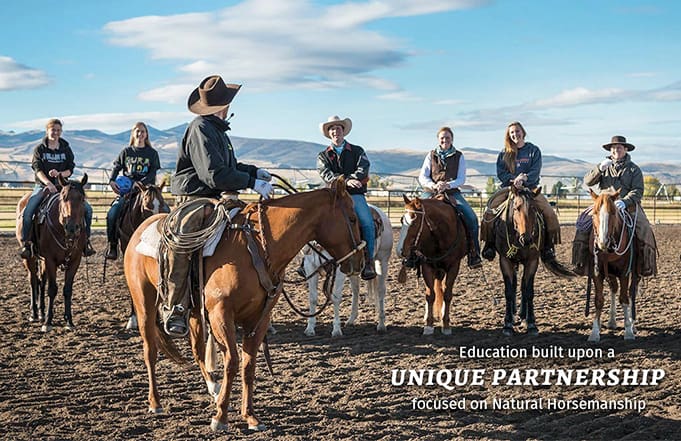Montana Center for Horsemanship Announces Major Gift
February 4, 2020
The Montana Center for Horsemanship, an equine education center and the only one in the nation devoted exclusively to natural horsemanship education and a partner with the University of Montana Western, is about to take a big leap forward. The nonprofit organization has just received a pledge of $250,000 to begin the development of state-of-the-art classrooms, a conference center, a veterinary/research area, kitchen and restrooms. The pledge requires matching funds to complete the Center’s expansion of these key areas.

The president of the Montana Center, William Kriegel, says, “This project is ground-breaking, and provides a significant opportunity for the Center to contribute to education in Montana and beyond as well as to advance natural horsemanship education while contributing to the local economies of Dillon, Beaverhead County, and Montana. Investing in the local community is a central part of our vision.”
The Montana Center teaches the ‘La Cense Method,’ which was developed under William Kriegel, owner of La Cense Montana and Haras de la Cense in France. Mr. Kriegel is also a co-founder and president of the Center, and has been involved in Natural Horsemanship for many years. The La Cense Method is a progressive, step-by-step process that blends the best of traditional horsemanship training with the art of training and riding horses—all in a manner that works with a horse’s behavior, instincts, and personality. Taking a positive and respectful approach, the La Cense Method gradually builds trust, and frees the horses to be confident in all they are asked to perform.
The Center, home to the nation’s first and only four-year accredited Bachelor of Science degree in Natural Horsemanship with options in equine management, psychology, science, business and instruction, in partnership with the University of Montana Western, has seen growing demand for the program beyond what current capacity allows. This expansion, says the Director of Horsemanship, Eric Hoffmann, will further the Center’s mission in many ways.
“Greater capacity means opportunities for more students, from Montana, nationwide and even from other countries. Natural Horsemanship is the foundation of this program, but students pursue other academic studies, and many have dual majors in business management and other disciplines with natural horsemanship. Many graduates have successful careers in the equine industry and related fields, and many are pursuing advanced degrees in veterinary medicine, equine research and science. If we can achieve matching funds, the impact of this program will be significant,” Hoffmann explained.
Education is central to the vision of the Montana Center and part of that is vision is for MCH to become a national center hosting conferences, symposiums, workshops and other equine and education events. The Center hopes to host events of any size and type with video conferencing capabilities and advanced technology. Being able to connect the Center worldwide, with experts – scientists, trainers, students and public audiences, according to Kriegel, is key. The first international conference, “Of Horse, Human and Nature”, featuring Dr. Temple Grandin with other renowned individuals in the equine world, is scheduled for September 10-12, 2020 at the Montana Center. With special guests, speakers, panels, workshops, horse films and horse and rider demonstrations, the Center is poised to welcome attendees from across the nation and around the world.
Janet Rose, Director of Development & Communications, says the match to this pledge of $250,000 is critical to the Center’s future. “There is no other program like this in the U.S.; where education and natural horsemanship are the foundation of a one-of-a-kind degree; where natural horsemanship is the basis for learning regardless of one’s riding discipline or horse interests. To have a program like this, in a place where western traditions are thriving, and students from all over, can achieve a top-notch education and be fully prepared for meaningful careers in a range of equine fields – that is both unique and important to the future of our young adults.” Rose adds that the Center hopes for a full match to the pledge but welcomes partial matches as well, which can be earmarked for scholarships, additional horse housing and honorary sponsorships of specific areas.
Board President William Kriegel adds, “A match to this donation will change the future – for students, researchers, scientists, people who study, enjoy, work with horses and those who want to learn about horses. It will also change the future for horses. Our goal is to advance the well-being of horse and human; it’s a unique relationship, we have a lot to learn from the horse and the horse has a lot to give. We are in a new era in understanding how unique and important the horse-human relationship is, in a universal way. The Montana Center for Horsemanship can help us achieve that vision.”
For more information about the Montana Center for Horsemanship, contact the William Kriegel Foundation Director of Development and Communications, Janet Rose, at [email protected].
